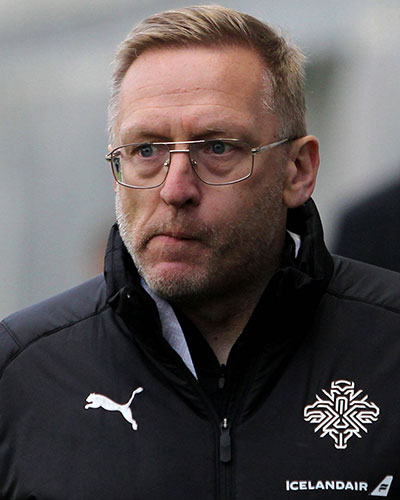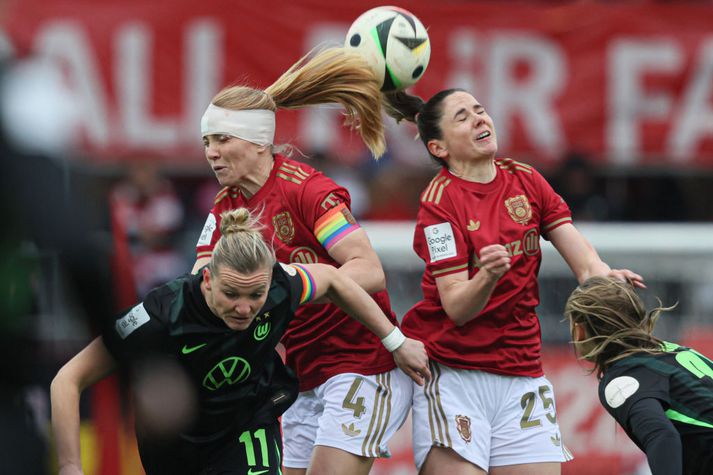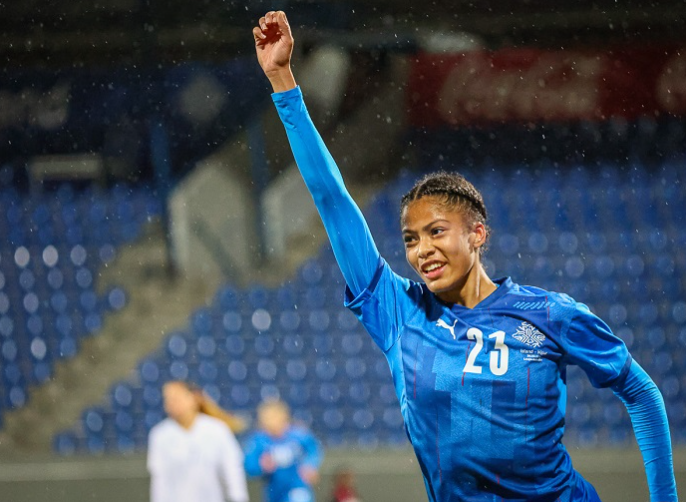By Catherine MacKenzie (19/6/25)
Above: Iceland celebrate qualifying for the 2025 Euros. Photo: KSI website.
With a population of under 370,000, Iceland is the smallest nation taking part in the 2025 European Championships.
This figure represents 4.2% of London’s population of 8.9 million, and with a population of approximately 5.3 million, Sydney is about 14 times larger than the entire population of Iceland.
The Icelandic women’s football league began in 1972, marking the country’s first formal step into the women’s game. By 1976, participation had dwindled to just five teams, prompting a shift away from the group stage format. Instead, the teams competed in a single division, playing home and away fixtures. The following years were marked by continued decline, as structural issues – such as limited training opportunities, little access to grass pitches, and the absence of youth development programs contributed to shrinking numbers.
The low point came in 1980, when only three teams entered the competition. However, the following year signalled a turning point as five new teams joined the league and there was major expansion by 1982. Currently named the Besta deild kvenna (“Women’s Best Division”), currently ten teams compete in a double round-robin format, with the league winner earning a place in the UEFA Women’s Champions League.
The Iceland women’s national football team played its first game on 20 September 1981, facing Scotland in a 3-2 loss. They are ranked 13th in the FIFA world rankings and first qualified for a major tournament in 2008. The team are nicknamed the Stelpurnar okkar (Our Girls).
Squad
Goalkeepers: Cecilía Rúnarsdóttir (Bayern Munich),Telma Ívarsdóttir (Rangers), Fanney Birkisdóttir (BK Häcken).
Defenders: Glódís Viggósdóttir (Bayern Munich), Ingibjörg Sigurdardóttir (Brøndby), Natasha Anasi (Valur Reykjavík), Gudrún Arnardóttir (Rosengård), Gudny Árnadóttir (Kristianstads DFF), Hafrún Halldórsdóttir (Brøndby).
Midfielders: Berglind Ágústsdóttir (Sporting de Huelva), Dagný Brynjarsdóttir (West Ham United), Alexandra Jóhannsdóttir (Kristianstads DFF), Áslaug Munda Gunnlaugsdóttir (Breiðablik), Karólína Vilhjálmsdóttir (Bayer Leverkusen), Katla Tryggvadóttir (Kristianstads DFF), Sædís Heiðarsdóttir (Vålerenga), Hildur Antonsdóttir (Breidablik).
Forwards: Sandra Jessen (Þór/KA), Dilja Zomers (OH Leuven), Hlín Eiríksdóttir (Leicester City), Amanda Andradóttir (FC Twente), Sveindís Jónsdóttir (Wolfsburg), Agla María Albertsdóttir (BK Häcken).
Head Coach
Appointed in early 2021, Þorsteinn Halldórsson arrived with experience across both the men’s and women’s club game in Iceland. As a former player, he had spells with numerous Icelandic clubs, earning youth call-ups at both U-19 and U-21 levels for the national team.
 Above: Þorsteinn Halldórsson. Photo: KSI.
Above: Þorsteinn Halldórsson. Photo: KSI.Halldórsson’s coaching journey began in 1993 with Fram’s women’s side, though it was not until 2001 that he started managing women’s football full-time. Over the next two decades, he led several clubs, notably guiding Breiðablik to three league titles between 2014 and 2020.
At the helm of the national team, Halldórsson oversaw Iceland’s UEFA Women’s EURO 2022 campaign, where his side drew all three group matches, most notably against France. Off the pitch, football runs in the family; he is the father of Jón Dagur Thorsteinsson, a regular for Iceland’s men’s national team.
The 57-year-old has overseen 48 matches: 22 wins, 12 draws, and 14 losses.
Euros history
Iceland qualified for their first Euros in 2008 and have qualified for every competition since. Their best finish was in 2013, where they reached the quarterfinals, beating the Netherlands to come third in their group and progress to the knockout rounds. In all other appearances, they failed to make it out of the group stage, although there have been standout performances. For example, in the 2022 competition, they held France to a thrilling 1-1 draw, becoming the first team to draw all three games in a Euros group and the first team to exit at the group stage unbeaten.
How they qualified
Iceland were in a qualification group alongside Poland, Germany, and Austria – winning four (notably including a 3-0 win over Germany), drawing one, and losing one. They finished second in the group behind Germany, qualifying automatically.
Strengths
Iceland are known to be a team that can give ‘stronger’ teams a run for their money. Famously holding France to a draw in the 2022 Euros, in 2024 they also became the first team to beat Germany by three goals in a competitive game since Brazil in the 2008 Olympic semi-finals.
A key part of this ability is their defensive solidity and cohesion. They have the adaptability to switch between a 4-3-3 and a deeper 3-5-1 against high-pressing teams, and look comfortable in either formation. They are also dangerous from set-pieces, possess a long throw-in threat—underestimating Sveindís Jónsdóttir’s throws has been the downfall of many teams in the past.
Development areas
In a scenario that may sound familiar to followers of England’s Lionesses, none of Iceland’s goalkeepers have more than 20 senior caps. Aside from set-pieces and throw-ins, they also have bouts of struggling creatively and can have trouble scoring goals. The balance between their defensive 3-5-1 and more attacking 4-3-3 can be missed sometimes, leaving them vulnerable on the transition and short defensively.
Key players
It feels like a cliché to highlight captain Glódís Perla Viggósdóttir; however, the stability she brings in defence is unparalleled. Playing her club football for Bayern Munich (where she is also captain), the defender is always at the forefront of the action, even recently continuing to play after taking a heavy blow to the face that left her needing a hefty bandage. Viggósdóttir has an instinctive calmness on the ball, is strong in duels, and incredibly consistent.
 Above: Glódís Perla Viggósdóttir (left) continued playing with a head injury. Photo: Visir.
Above: Glódís Perla Viggósdóttir (left) continued playing with a head injury. Photo: Visir.Further forward in midfield, Karólína Lea Vilhjálmsdóttir is a rising young star. The twenty-three-year-old has four assists and four goals in her last ten games in all competitions and has become a consistent starter for Bayer Leverkusen as they aim to challenge the German top three. She is versatile, able to play in both the eight and the ten positions, she has excellent control of the ball, and is known for incisive through balls.
One to watch
Sveindis Jane Jonsdottir recently made the switch from VfL Wolfsburg to Angel City in the NWSL and is one of the team’s most important young players. She made an explosive debut on the international stage in September 2020, scoring twice in her first match for Iceland. With her pace as a primary attribute, she poses a constant threat in attack, capable of breaking through defences. Her exceptional long throw-ins are also a big benefit for her team’s attacking power.
 Above: Sveindis Jane Jonsdottir for Iceland. Photo: Haflioi Breiofjoro/fotbolti.net.
Above: Sveindis Jane Jonsdottir for Iceland. Photo: Haflioi Breiofjoro/fotbolti.net.On 11 December 2024, she made history as the first Icelander to score four goals in a single UEFA Women’s Champions League match. Coming off the bench, she netted all four goals within just 25 minutes, contributing to Wolfsburg’s 6–1 victory over AS Roma.
Success would be:
Making it to a first quarter-final since 2013.
Prediction:
In a relatively even group, it may come down to goal difference. They should be strong enough to progress alongside Norway, if Switzerland do not capitalise on home turf advantage.
Group fixtures:
2nd July – Finland, 6pm Arena Thun.
6th July – Switzerland, 9pm Wankdorf Stadium, Bern.
10th July – Norway, 10th July, 9pm Arena Thun.
This is the latest part of our Euros nation previews – click on the links below to view the previous articles:
SWITZERLAND: https://impetusfootball.org/2025/06/16/euros-preview-switzerland-2/
NORWAY: https://impetusfootball.org/2025/06/17/euros-preview-norway/
FINLAND: https://impetusfootball.org/2025/06/18/euros-preview-finland-2/
Follow Impetus on social media –
Twitter (X): @impetusfootball TikTok: @impetusfootball
Instagram: @impetusfootball
